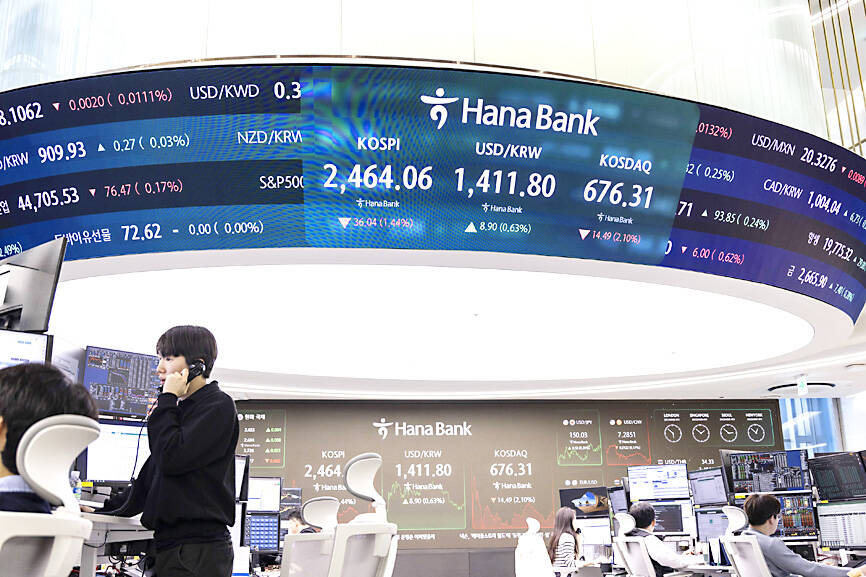South Korea’s currency recovered while its stocks fell yesterday, as investors braced for prolonged political uncertainties following a brief decree of martial law by South Korean President Yoon Suk-yeol.
The benchmark KOSPI closed 1.4 percent lower, while a gauge of equity volatility climbed by the most in three weeks. The won gained 1.2 percent to 1,410.56 per US dollar, erasing most of its overnight loss.
Yoon sparked chaos with the late Tuesday decree, sending the won and South Korea-related exchange-traded funds sharply lower overnight. The won has slumped about 9 percent against the US dollar this year, the worst performer among Asian currencies, while the KOSPI has dropped more than 7 percent.

Photo: Bloomberg
While extreme jitters dissipated as financial authorities swiftly vowed to provide “unlimited liquidity,” damage has been done to investor perception of South Korea’s financial markets.
It also poses a major setback for government efforts including the “Corporate Value-Up” program, which aims to erase the equity discount by making company boards more accountable to shareholders.
“This just adds to the disappointing track record for the government, and is not in line with the expectations investors have for a developed market,” Mirae Asset Global Investments Co chief investment officer An Joo-hee said in Hong Kong. “The latest drama is not going to help the [South] Korea market rerate when it’s already trading at steep discounts versus other Asian markets.”
The political turmoil does not bode well for the nation’s ongoing push for upgrades to developed market status in global indices. It is yet another blow to the stock market after Yoon’s administration shocked the global investment community with a sudden prohibition of short-selling about a year ago.
Efforts by the Yoon administration to reduce the “Korea Discount” — persistent undervaluation of the nation’s stocks — have had little impact. The KOSPI trades at about 0.8 times one-year forward estimated book value, while the MSCI World Index trades at 2.9 times, according to data compiled by Bloomberg.
South Korean Financial Services Commission Chairman Kim Byoung-hwan said after an emergency meeting that authorities would take “all possible measures” to ensure the stability of markets. A 10 trillion won (US$7 billion) stock market stabilization fund is ready to be deployed immediately if needed, he said.
The Bank of Korea’s (BOK) monetary board also announced steps to increase short-term liquidity and also pledged measures in the event of currency volatility.
BOK Governor Rhee Chang-yong said it is unlikely the central bank would cut interest rates as he played down the significance for the economy of the political chaos.
“This political event was very short-lived and I do not see any reason why we have to change our economic outlook at this moment,” Rhee said in an interview on Bloomberg TV yesterday. “I think we can focus on the economy’s strengths and the weaknesses of the economy rather than political side effects.”
Some traders were optimistic that a quick resolution to the standoff could bring a rebound.
“Markets will prefer a quick resolution to the stand-off and for political stability to return,” IG Asia Pte Ltd strategist Yeap Jun Rong (葉俊榮) said in Singapore.
Given Yoon’s low public ratings and difficulties enacting policies, “we may see some calm gradually return if more clarity were to be presented,” he added.

BYPASSING CHINA TARIFFS: In the first five months of this year, Foxconn sent US$4.4bn of iPhones to the US from India, compared with US$3.7bn in the whole of last year Nearly all the iPhones exported by Foxconn Technology Group (富士康科技集團) from India went to the US between March and last month, customs data showed, far above last year’s average of 50 percent and a clear sign of Apple Inc’s efforts to bypass high US tariffs imposed on China. The numbers, being reported by Reuters for the first time, show that Apple has realigned its India exports to almost exclusively serve the US market, when previously the devices were more widely distributed to nations including the Netherlands and the Czech Republic. During March to last month, Foxconn, known as Hon Hai Precision Industry

Taiwan Semiconductor Manufacturing Co (TSMC, 台積電) and the University of Tokyo (UTokyo) yesterday announced the launch of the TSMC-UTokyo Lab to promote advanced semiconductor research, education and talent development. The lab is TSMC’s first laboratory collaboration with a university outside Taiwan, the company said in a statement. The lab would leverage “the extensive knowledge, experience, and creativity” of both institutions, the company said. It is located in the Asano Section of UTokyo’s Hongo, Tokyo, campus and would be managed by UTokyo faculty, guided by directors from UTokyo and TSMC, the company said. TSMC began working with UTokyo in 2019, resulting in 21 research projects,

Ashton Hall’s morning routine involves dunking his head in iced Saratoga Spring Water. For the company that sells the bottled water — Hall’s brand of choice for drinking, brushing his teeth and submerging himself — that is fantastic news. “We’re so thankful to this incredible fitness influencer called Ashton Hall,” Saratoga owner Primo Brands Corp’s CEO Robbert Rietbroek said on an earnings call after Hall’s morning routine video went viral. “He really helped put our brand on the map.” Primo Brands, which was not affiliated with Hall when he made his video, is among the increasing number of companies benefiting from influencer

Quanta Computer Inc (廣達) chairman Barry Lam (林百里) yesterday expressed a downbeat view about the prospects of humanoid robots, given high manufacturing costs and a lack of target customers. Despite rising demand and high expectations for humanoid robots, high research-and-development costs and uncertain profitability remain major concerns, Lam told reporters following the company’s annual shareholders’ meeting in Taoyuan. “Since it seems a bit unworthy to use such high-cost robots to do household chores, I believe robots designed for specific purposes would be more valuable and present a better business opportunity,” Lam said Instead of investing in humanoid robots, Quanta has opted to invest